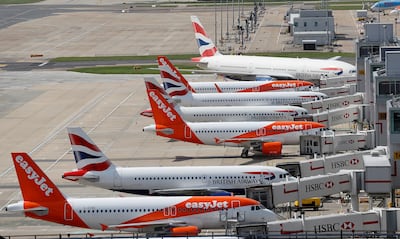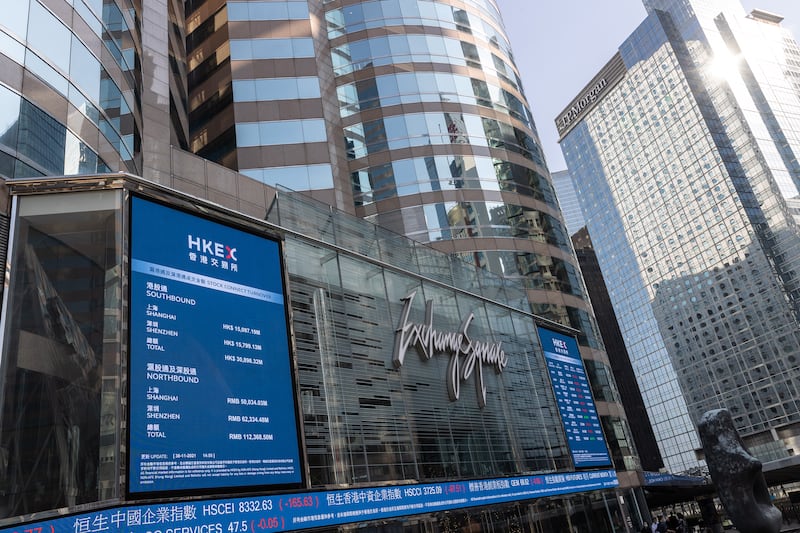Global financial markets plunged into the red on Tuesday after warnings from the boss of Moderna over the efficacy of Covid-19 vaccines against the Omicron variant compared to earlier strains of the virus spooked investors.
The UK’s FTSE100 dropped more than 1 per cent in early trading, hitting its lowest level since the start of October as crude oil futures shed more than a dollar, the Australian currency hit a year low, and Nikkei gave up its gains.
The alarm bells sounded after Moderna chief executive Stéphane Bancel said existing vaccines will be much less effective at tackling Omicron and it could take months for pharmaceutical firms to manufacture new variant-specific jabs at scale.
His comments spurred fears vaccine resistance could lead to more sickness and hospitalisations, prolonging the pandemic.
"There is no world, I think, where (the effectiveness) is the same level . . . we had with Delta," Mr Bancel said.
"I think it's going to be a material drop. I just don't know how much because we need to wait for the data. But all the scientists I've talked to . . . are like 'this is not going to be good.”
His definitiveness appeared to spook markets, with stocks in Asia retreating along with US and European index futures and crude oil.
Susannah Streeter, senior investment and markets analyst at Hargreaves Lansdown, said the roller coaster ride has resumed on the financial markets following Monday's rally.
"Investors are now strapping themselves in for a volatile ride anxious for any further news which could lift sentiment or send it plunging again, such as the comments from Moderna’s chief executive that current vaccines will struggle with Omicron because of the high level of mutations on the spike protein," said Ms Streeter.
"It’s not known just how less effective they may be, and the waiting game continues as scientists scramble to assess the new variant, but amid this state of uncertainty, nervousness is high, with the FTSE 100 falling 1 per cent in early trade."
European stocks fell more than 1 per cent on Tuesday with the pan-European STOXX 600 dropping 1.3 per cent by 8.15am London time to hit its lowest levels in nearly seven weeks. Germany's DAX, France's CAC 40 and UK's FTSE 100 fell between 1.1 per cent and 1.5 per cent in early trading.
Oil stocks fell 1.6 per cent, tracking a drop in crude prices and bank stocks sank 1.6 per cent to their lowest in more than two months.
"Energy stocks and banks are among the biggest fallers as investors worry about the economic effect of Omicron, as it risks dampening down demand and becoming a significant set-back for global economy. Brent crude fell 3 per cent to $71 a barrel, pulling down energy stocks like BP and Shell by more than 1 per cent in early trade," said Ms Streeter.
Meanwhile, travel stocks shed 1.1 per cent, with British airline easyJet trading nearly flat after reporting softer demand in the first quarter following the emergence of the Omicron variant.
However, the airline was bullish about a recovery in passenger levels, predicting 70 per cent of pre-Covid 2019 levels in the second quarter and a near total recovery by the summer.

Adam Vettese, analyst at multi-asset investment platform eToro, said while easyJet’s full-year loss has come in ahead of consensus, most of its key financial indicators are significantly lower than they were last year.
“The emergence of the Omicron coronavirus variant has dealt a hammer blow to the airline industry just as it was once again finding its feet after 18 long and painful months," said Mr Vettese
“While we’re not sure yet if the latest variant is more deadly than the ones we’ve seen in the past, governments have rushed to close their borders again in a bid to act early and prevent it spreading."
The pandemic-sensitive sectors slumped last week when the Omicron variant was first detected in South Africa, pushing the benchmark STOXX 600 to its worst single-day performance in more than a year on Friday.
Lack of fresh updates on the variant proved to be a relief on Monday, but European stocks are on course to end November with losses of nearly 3 per cent.
The latest dip in the FTSE100 puts the UK's blue-chip index on course for its worst month in more than a year, with monthly declines of 2.8 per cent.
Amid the pessimism about the effectiveness of vaccines, AstraZeneca is among the biggest fallers on the FTSE 100 so far with a drop of up to 2.2 per cent in morning trading.
"Its vaccine has been produced at cost and now investors are clearly wondering if they will ever see a profit from this part of the business," said Ms Streeter.
Omicron - which the World Health Organisation said carries a "very high" risk of infection surges - has triggered global alarm, with border closures casting a shadow over a nascent economic recovery from a two-year pandemic.
While news of its emergence wiped about $2 trillion off the value of global stocks on Friday, some calm was restored at the start of this week with President Joe Biden also helping to soothe the markets when he said the US would not reinstate lockdowns.
Research is still under way to determine if omicron causes the same level of illness as older versions of the virus and whether it can evade protection from vaccines and previous infections.







